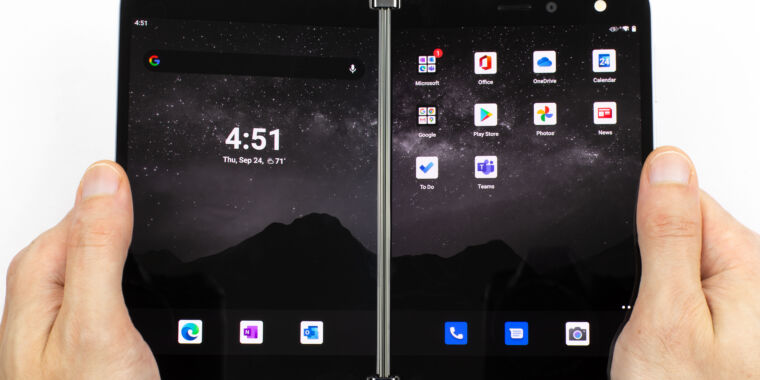
-
The Microsoft Surface Duo. It’s very big.Ron Amadeo
-
There’s something very satisfying about flattening it down on a table.Ron Amadeo
-
The hinge will stop anywhere you want it to stop.Ron Amadeo
-
Fold it all the way over for single-screen mode.Ron Amadeo
-
If you’re looking at the wrong side in single screen mode, just double-tap the screen.Ron Amadeo
-
All folded up. And that’s a Microsoft logo on the front, not a Windows logo.Ron Amadeo
-
The top has big bezels, an earpiece, and a single camera and LED flash. This is the only camera on the entire phone.Ron Amadeo
-
Ron Amadeo
-
The spine is very shiny.Ron Amadeo
-
There is some alarmingly thin plastic around the bottom USB-C port.Ron Amadeo
If Microsoft wants to be taken seriously as an Android manufacturer, one of the things it will need to establish is a track record of reliable, on-time software updates. But as the company launches a second generation of the Surface Duo and the company’s first Android phone turns a year old, so far Microsoft has failed to impress.
The Surface Duo 1 shipped in September 2020 with Android 10, which was a full year old at the time, and Android 11 had already launched. The hope was that Microsoft would quickly update the Duo to the latest version of Android, but that never happened. Today the device is still running Android 10, which is now two years old, and Android 12 is about to ship. Microsoft has finally broken its silence about Surface Duo 1 updates, and the company tells The Verge it plans to update the device to Android 11 “before the end of this year.”
Assuming Microsoft follows through on its promise, the company’s $1,400 flagship device will be updated from a two-year-old operating system to a one-year-old operating system. Microsoft committed to three years of updates, and it has been delivering monthly security updates. But this is still worst-in-class update support, especially for the price. Samsung usually rolls out Android to its latest flagship three months after Google’s release, while OnePlus usually takes around a month—Microsoft’s one-year timeframe is really bad.
Microsoft is, at least, communicating. Before, it never really let its customers know when Android 11 would be arriving on the Surface Duo until this latest report, leaving the rumor mill to fill in the gaps. It would be nice to get a timeframe for Android 12 releases, given the latest update will be out any day now. Perhaps Microsoft’s lack of communication was due to the company just not knowing when Android 11 would be done. The Android 10 build that shipped on the original Duo had all sorts of bugs, and the company is clearly having a hard time transitioning to Android.
Perhaps some of Microsoft’s update problems were caused by the Duo 1 originally being designed for a now-canceled mobile resurrection of Windows; Microsoft was essentially forced to switch to Android later in that product’s development life. Unsurprisingly, the Windows-maker didn’t have a lot of Android OS engineers on staff at the time, and Microsoft ended up outsourcing the Duo’s OS development to a company called “Movial.” Microsoft ended up acquiring Movial just two months before the Duo’s release date, which doesn’t sound like ideal timing.
The Duo 1’s Windows DNA resulted in a device with very different underpinnings from a normal Android phone, like a “custom engineered” Microsoft UEFI instead of the normal Qualcomm one. The Duo 2 should have been designed from the start with Android as the target, so maybe things will be better for the sequel?
Listing image by Ron Amadeo
https://arstechnica.com/?p=1798192

